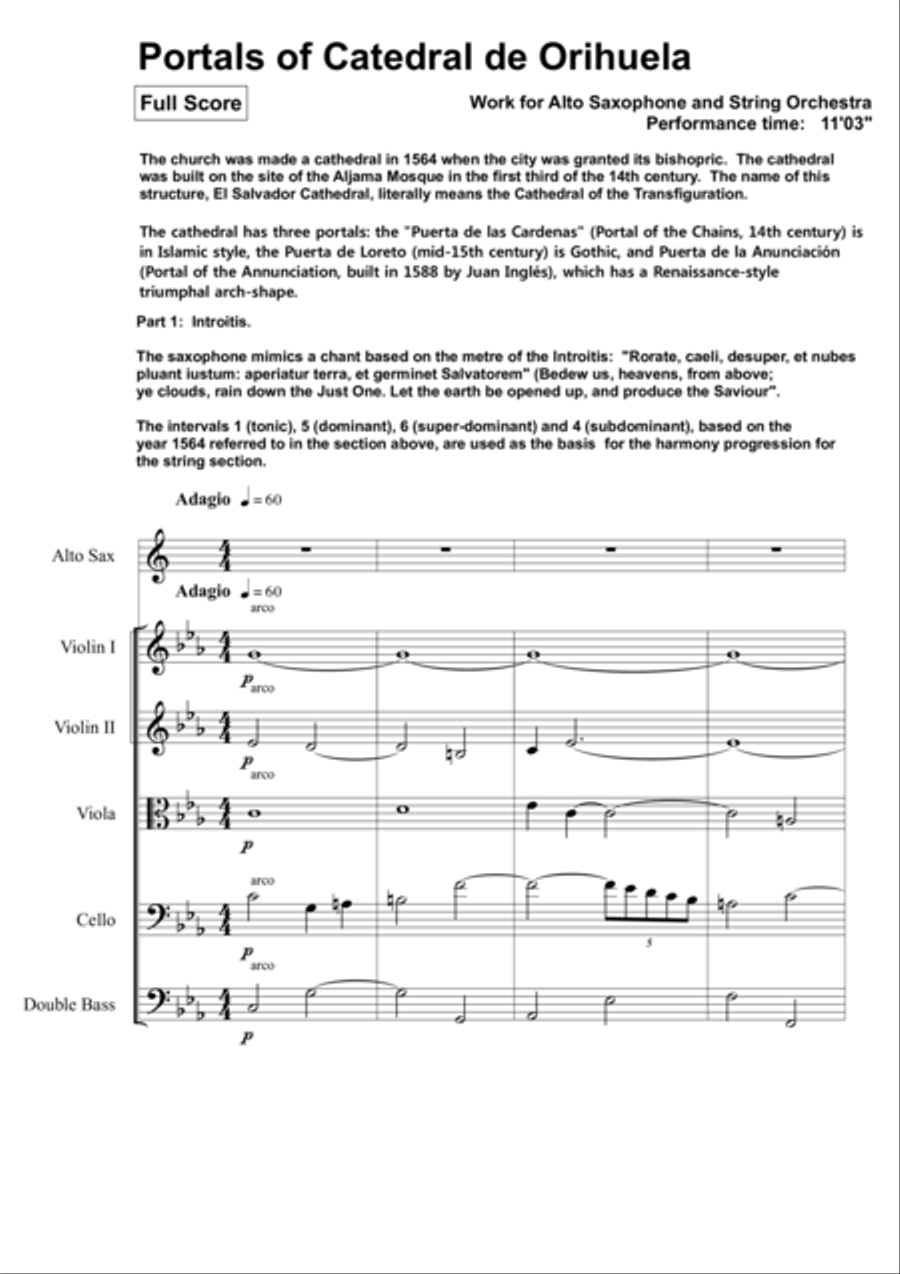Small Ensemble Cello,Double Bass,Saxophone,Viola,Violin - Level 5 - Digital Download SKU: A0.938331 Composed by Dr Anthony Costandius. Christian,Contemporary,Sacred. Score and parts. 72 pages. Anthony Costandius Music #14899. Published by Anthony Costandius Music (A0.938331). A piece for solo Alto Saxophone and String Orchestra. The church was made a cathedral in 1564 when the city was granted its bishopric. The cathedral was built on the site of the Aljama Mosque in the first third of the 14th century. The name of this structure, El Salvador Cathedral, literally means the Cathedral of the Transfiguration. The cathedral has three portals: the Puerta de las Cardenas (Portal of the Chains, 14th century) is in Islamic style, the Puerta de Loreto (mid-15th century) is Gothic, and Puerta de la Anunciación (Portal of the Annunciation, built in 1588 by Juan Inglés), which has a Renaissance-style triumphal arch-shape. Part 1: Introitis. The saxophone mimics a chant based on the metre of the Introitis: Rorate, caeli, desuper, et nubes pluant iustum: aperiatur terra, et germinet Salvatorem (Bedew us, heavens, from above; ye clouds, rain down the Just One. Let the earth be opened up, and produce the Saviour. The intervals 1 (tonic), 5 (dominant), 6 (super-dominant) and 4 (subdominant), based on the year 1564 referred to in the section above, are used as the basis for the harmony progression for the string section. Part 2: Puerta de las Cardenas Acts 12:3â19 says that Peter was put into prison by King Herod, but the night before his trial an angel appeared to him, and told him to leave. Peter's chains fell off, and he followed the angel out of prison, thinking it was a vision (verse 9). The prison doors opened of their own accord, and the angel led Peter into the city. The visit from the angel, release from the chains and the prison, as well as the journey into the city is expressed against the background of the Islamic design of the portal, hence the referral to Arabian rhythms and scales in the music. Part 3: Puerta de Loreto The Puerta de Loreto is of gothic design. Loreto refers to the Italian city of Loreto in the province of Ancona. It is said that the holy house where the Mother Mary lived in Nazareth was translated miraculously to Loreto on December 19, 1294 - more than 700 years ago. The house did not go straight to Loreto, but in the year 1291 it was miraculously transported from Nazareth to the town of Tersatto in Dalmatia (Croatia). The local population, filled with astonishment, did not know how to explain its sudden appearance. Their Bishop, who was gravely ill, now appeared in their midst cured. He had prayed to the Virgin Mary that he might be strong enough to see the prodigy for himself, and the Mother of God appeared to him, surrounded by Angels, saying: My son, you have called for me, and here I am. I came to give you succor and to reveal to you the mystery [of the translation of the Holy House] you desire to know. The holy dwelling is the very house where I was born and raised. It was there that I received the good news brought by the Archangel Gabriel and I conceived the Divine Infant by the operation of the Holy Ghost. It was there that the Word was made flesh... For you to bear witness to all that I am telling you now, you will suddenly be cured and return to full health after the long illness you have borne, so that through you all will believe in this miracle. Part 4: Puerta de la Anunciación The Annunciation is the Christian celebration of the announcement by the angel Gabriel to the Virgin Mary that she would conceive and become the mother of Jesus, the Son of God, marking his Incarnation. Gabriel told Mary to name her son Jesus, meaning Saviour. Part 5: Exit The work ends with a re-interpretation of the first section, the Introitis. This is to bind the work together, but also to again reflect on the text, as stated: Rorate, caeli, desuper, et nubes pluant iustum: a periatur terra, et germinet Salvatorem, and to comtemplate how that gives meaning to the being, essence and history of the Catedral de Orihuela.
